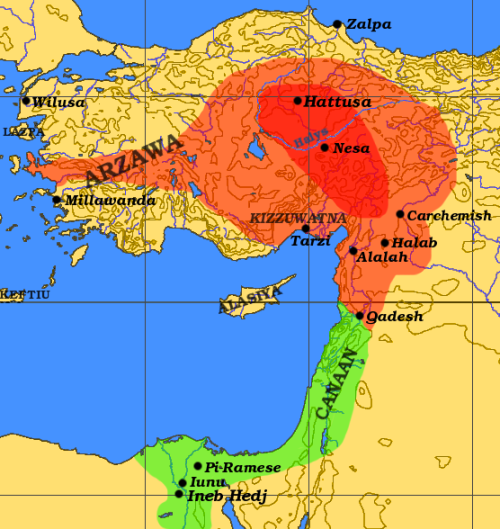Both Egyptian and Hittite interest in obtaining the coastal region of the Mediterranean saw many uneasy maneuverings (in the form of short-lived strategic treaties) as skirmishes between the two were not uncommon. To their east flank, whenever a Mitannian military unit appeared on the horizon, a marriage proposal would be offered by both greater powers, an offer that would curry favor and ensure an elevated status in such a way that flattered the king of Mitanni into neutrality in all matters, an effective deterrent in their sending any assistance of Egypt or Hatti over the other.
Thus intermarriages especially became commonplace toward the beginning of 15th century BC and was not merely exclusive between these three kingdoms. Letters during this century included an elaborate recounting of a Babylonian princess marrying into the Egyptian royal harem1.
The use of gold as a bargaining tool for bribery was another tactic of advanced statesmanship between sides in their respective courts. If a king rejected a gift of gold douceurs per se, reasoning that the presentation was too meagre an offer and taken as a slight. . . Well, that could very well be the means for the Hittites to attack the Egyptians and vice versa. By the same token, it could also buy temporary friendship between sides, which was rather more the customary outcome whenever gold was utilized in this fashion.
Well into Thutmose III's reign (1501-1447), on his twenty second year, he led his Egyptian army into a large scale invasion of Palestine, leaving the prince of Kadesh (Qadesh) and his allies to scramble together an ill-prepared and futile defense. News travelled quickly and was brought before the king of Assyria, and when Thutmose's legion eventually crossed the Euphrates, they were greeted with open arms and gifts, in the form of gold, silver, and lapis2.
After this exchange, the Egyptian king viewed Assyria favorably as evidenced by a certain cuneiform letter by an Assyrian man, Adadnirari, of which its text bears mention how Thutmose III had appointed his grandfather, Taku, as a chief to preside over an area known as Nukhashshi. The Egyptian king entrusted a foreigner with a position of power, the birth of a new concept: Delegation.
At this point, Egypt's expansion claimed Halab (Aleppo) and Carchemish, and friendly relations from the empire were opened, using the successful interactions with Assyria as a reference point, and soon other nations began to accept to the absolute authority of Thutmose III. The Yezedis (Kurdish) were allowed to occupy the foothills between the two great rivers (Euphrates and Tigris) unmolested. Even the Hittites began to offer gifts suing for peace, for the reputation of Egypt's rule during 15th century BC was unquestionable and unmatched.
- Many pharaohs possessed a number of wives and courtesans, and the royal harem was not a place of disgrace in the public eye of the Egyptian people, much to the contrary, such an inclusion meant to be recognized as an official family member of the 18th Dynasty's ruler. To be among those within the royal harem implied a certain prestige and a mutual voice of power reserved only for those who dwelt within this modest collective.
- In Ancient History - Part 1 the Mitanni had absconded with the prized gold and silver gate of Ashur, Assyria's capital city. It can be easily understood how the Assyrians were spared from Thutmose III's wroth, yet the Mitanni were not. One hand would appear to wash the other and perhaps revenge was best served cold vis-à-vis with the blade and chariot of Assyria's new ally, the Egyptian conquerors.




No comments:
Post a Comment